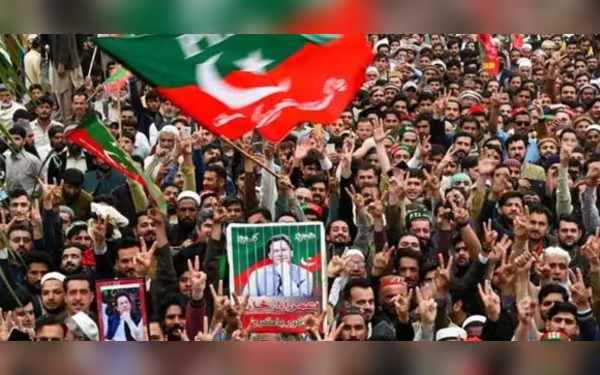Thursday, December 5, 2024 02:18 AM
PTI Protests Following Imran Khan's Ouster in Pakistan
- PTI protests escalate after Imran Khan's ouster.
- Demonstrators demand Khan's release and early elections.
- Violent clashes highlight deep societal divisions.
 Image Credits: pakobserver
Image Credits: pakobserverPTI protests surge in Pakistan following Imran Khan's ouster, demanding his release and early elections amid escalating tensions.
In recent months, Pakistan has witnessed a series of significant protests led by the Pakistan Tehreek-e-Insaf (PTI) party, following the ousting of its leader, Imran Khan. The political landscape in the country has been tumultuous, with Khan's removal through a no-confidence vote sparking widespread demonstrations across various cities. Supporters of Khan, who is not only a former Prime Minister but also a celebrated cricketer, have taken to the streets to express their discontent and demand his release from custody.
The protests began in earnest when thousands of PTI leaders and supporters converged on the capital, Islamabad, planning a sit-in at D Chowk. Their primary demand was the release of their party founder, Imran Khan. Protesters voiced their frustrations over what they described as a "communication blackout" and the blocking of major roads, which they claimed were tactics used by the government to suppress their voices. The demonstrators emphasized that their actions were not solely for Khan but also for the future of the nation.
As the situation unfolded, the timeline of events revealed a pattern of escalating tensions. Following Khan's ouster, he led an "Azadi March" to Islamabad, which unfortunately resulted in violent clashes with security forces. During this period, Khan issued a six-day ultimatum to the government, demanding early elections. However, the second long march faced a setback when Khan was shot during a rally in Wazirabad. Despite this, the march continued until the end of November, showcasing the unwavering determination of PTI supporters.
The protests intensified after Khan's arrest in the Al-Qadir Trust case, leading to violent demonstrations across the country. These protests resulted in fatalities and attacks on military and public property, highlighting the deep divisions within the society. PTI organized further protests, claiming that the election results announced on February 8 were rigged. Demonstrations took place both inside and outside the parliament, reflecting the party's commitment to challenging the status quo.
In Islamabad, PTI held a rally demanding Khan's release, which led to clashes with police and roadblocks. The situation escalated when PTI attempted to stage a protest at D Chowk, resulting in violent confrontations with law enforcement, road blockages, and disruptions to public transport services. The party also organized protests against the proposed 26th Constitutional Amendment, despite the imposition of Section 144, which prohibits gatherings in certain areas.
As the protests continue, the agitators remain at D Chowk, a sensitive area that houses key government buildings. The ongoing unrest reflects not only the political struggles within Pakistan but also the passionate commitment of PTI supporters to their cause. The situation remains fluid, and it is clear that the political future of Pakistan will be shaped by these events.
The protests led by PTI following Imran Khan's ouster are a testament to the fervent political engagement of the Pakistani populace. As citizens rally for their beliefs, it is essential to recognize the broader implications of these demonstrations on the country's democratic processes. The outcome of this unrest will undoubtedly influence the political landscape for years to come, making it crucial for all stakeholders to engage in dialogue and seek peaceful resolutions.













